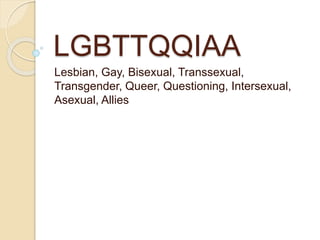
LGBT Presentation
- 1. LGBTTQQIAA Lesbian, Gay, Bisexual, Transsexual, Transgender, Queer, Questioning, Intersexual, Asexual, Allies
- 2. Why all the letters? Argument for: ◦ It is important to show inclusion ◦ Everyone should be represented ◦ Everyone should be able to name themselves Argument against: ◦ Burdensome and repetitive ◦ We should just have “all rights” ◦ Overkill on P.C.
- 3. Why Names are Important Language = Power When names are assigned they can be damaging ◦ Historically, to name something is to control it through classification When chosen they can be empowering ◦ To choose your own name is to “choose your identity” When re-claimed they can be motivating ◦ To take back something that was once degrading and to own it as positive puts the power back in your hands A name is an identity and classification. A word assigned to mean something is symbolic of the object. To name is to have the power
- 4. Apologetics to the P.C. Haters (AKA “check your privilege”) Common complaint: there are too many names, everyone wants their own special interest group, you can’t even make a joke anymore without offending someone Privilege = a right or benefit that is given to some people and not to others CHECK YOUR PRIVILEGE ◦ Sometimes insulting statement, but good to remember for yourself; ask yourself where your perspective is coming from ◦ If something is bothering someone else but not you, perhaps it is because you don’t have the same experience, and vice versa Humor often comes at the expense of an identity, group, or type of person Complaining that the world is too “P.C.” is a huge exhibition of privilege Ask yourself, “Who has the power?”
- 5. Apologetics to the Umbrella Termers Common complaint: it should just be “human rights” rather than trying to name everything CHECK YOUR PRIVILEGE People need to see themselves represented in larger culture in order to feel accepted, valued, and like their lives matter By asking everyone to lump themselves together into one term, you are asking them to disappear Ask yourself, “How do I identify? Do I see that in popular culture? Who am I not seeing?”
- 6. Violence Awareness Hate crimes and violence against non-normative sexually-identified individuals have been increasingly reported as the discourse grows on the range of human sexuality 2012: 19.6% of single-bias crimes were motivated by sexual orientation (http://www.fbi.gov) The Violence Prevention Works website reported that “as many as 93% of teenagers hear derogatory words about sexual orientation at least once in a while…and half of teens surveyed hear such words every day at school and in the community.” (violencepreventionworks.org) LGBTTQQIAA students are two to three times more likely to commit suicide than heterosexual students LGBTTQQIAA students comprise 30% of all completed youth suicides
- 7. Why is this a Feminist Issue? Intersectional feminism stands by the principle that when you raise up any group, we all stand a little higher Freeing sexuality from patriarchal confines that dictate gender roles is critical to the feminist movement Normalizing cis-gender, heterosexual choices is paramount to moving the conversation forward
- 8. Current Issues Although gay marriage is legal according to the Supreme Court, most of the people who are able to license marriages have elected not to do so (denying people that same right) Kim Davis and others as religious martyrs Paradigmatic challenges leading to microaggressions ◦ These are everyday exertions of power that are usually the result of privilege ◦ To a gay couple, “I have a gay question…” ◦ To a woman, “When are you getting married?” ◦ To a little boy, “Do you have a little girlfriend yet?” Additionally, it is still legal in many states for your employer to fire you for having a lifestyle they don’t agree with In right-to-work states, they don’t even have to give you a reason, but can fire you for any exhibition of difference In short, we have a long way to go in cultural acceptance, dissembling of privilege, and celebration of diversity
- 9. Focusing our Power! We can continue to open the space in our culture for conversation about non-normative identities We can personally withhold from judging people who do not make the same choices as us We can support non-normative people in their journeys and channel our resources to business and other endeavors that are run by non- normative peoples We can continue to lobby and support legislation that supports individual choices and basic human rights (such as gay marriage) We can teach our children not to bully those who are different from themselves and set an example of compassion and acceptance